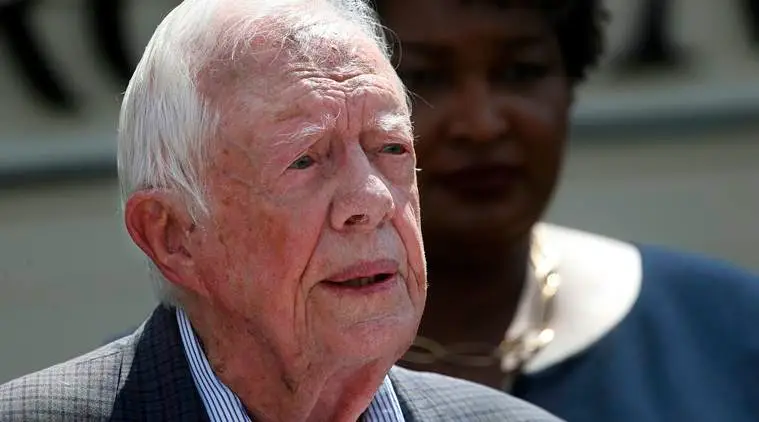Jimmy Carter is turning 100: ‘America’s Longest-Living President’

Jimmy Carter, the longest-living U.S. president, celebrates a special birthday on Oct. 1, 2024 when he turns 100 years old! Since his birth in 1924, the former 39th president has observed a nation and world that have evolved from myriad flashpoints. And an overview of the life of Carter and his world over this span of 100 years.
A Growing Nation and World
Jimmy Carter was born when the U.S. population stood at a mere 114 million or so. At present, the number has almost tripled to 330 million today. In the same time, the global population expanded fourfold (from 1.9 billion to more than 8.1 billion). Yet for all this global impact, the place Carter lived most of his life — in his small hometown of Plains, which has only grown from fewer than 500 residents to around 700 today — is almost incongruously static.
Where Are We Today in Life Expectancy?
In Carter’s year of birth, the average life expectancy for American men was only 58. Today, it stands at 75. He has witnessed the ascendancy of radio, America’s first broadcast presidential television appearance and the evolution of color-coded election swing maps that shaped U.S. politics.
It was first popularized by the NBC network during Carter’s 1976 race against incumbent president Gerald Ford. What’s odd about that — again, hiding the map behind a click so non-spoilers need not worry — is that Carter states are colored red and Ford blue, the exact opposite of the familiar red-state/blue-state arrangement.
Changing Consumer Landscape
After all, he noted that the day-to-day breads and butters had already been replaced to an extent with modern vessels like Amazon Prime (built to Conrad’s “maze for capital”), though it was still a good time to send a few hundred dollars and have oneself delivered a house via Sears Roebuck catalog. Supply chains and profit margins were not issues in those days, and loaves of bread could be had for only 9 cents while a gallon of fuel cost a mere 11 cents, offered by the local general-store.
During Carter presidency, inflation was one of the major reasons he lost in 1980. Related: As adjusted for inflation, the price of gas…. might be a little over $3.25 (the cost during Carter’s final year in office…. about equal to the national average these days).
When my dad’s fury about Benji led him to become a lifelong champion of civil rights and human rights
Carter’s public service legacy was driven by a commitment to civil rights. Georgia’s first governor to oppose segregation, he famously said “the time for racial discrimination is over.” He then appointed more black Georgians than anyone in history to public office–and together he and his first lady, Rosalynn, transformed state prisons and mental-facility treatment.
While in the realm of foreign policy, Carter was one of the most successful presidents over national matters. The Hafner administration was best known for leading the Camp David Accords, which led to a historic agreement between Israel and Egypt that continues to stand as one of his most lasting achievements. Carter also used human rights policy as an implement of foreign affairs, rekindling the hopes of persecuted peoples in Latin America and beyond.
Pros:Jimmy Carter the outsider
None of that is typical for a man who rises to the presidency. From successful farmer, businessman and governor of Georgia, he was an outsider among Washington politicos. His promises of trust and moral integrity during a time when the country was at incredibly low levels of faith in her leaders in the wake of Watergate turned Jimmy Carter, as little-known as just about anybody we have ever managed to elect president, into a sensation.
Although Carter did help to broker peace between Egypt and Israel, his single term is frequently remembered more for the difficulties that he faced than for his accomplishments: the Iran hostage crisis and stagflation (high inflation combined with stagnant growth within an economy). While Obama was an outsider who had a hard time wielding power in Washington — which he refused to acknowledge when he lost control of the machinery of government during the first two years after Democrats took control of Congress and held it until January 2011 — on one level he is right that there were never more than a few days when every Democrat in Washington marched lock-step behind him on any issue. Decades after, when Carter was still not invited to speak at the 2008 Democratic National Convention, it became clear that there were many still in his party who viewed any discussion of his presidency as a frame-up.
A Global Humanitarian
While Carter was an uneven president politically, his elder statesman days as a humanitarian have helped dim the harsh rectangles that defined earlier memories. He has supported the causes of disease eradication, democracy and human rights for years through The Carter Center. He was awarded the Nobel Peace Prize in 2002 for his work to find peaceful solutions to international conflicts, advance democracy and human rights, and promote economic and social development.
Looking to the Future
His is a legacy that has long-inspired, from his days as president to his efforts as a humanitarian and advocate for civil rights and global peace. Even in his final days, Carter’s family said he still has hope and is looking forward to seeing the first woman president stepping into office; an historic moment that could potentially be Vice President Kamala Harris.
The life of Jimmy Carter covers great transitions in the modern era, from segregation to Silicon Valley. But from a small town in Georgia to heights no one could have predicted and so far beyond what he might have imagined, Carter is the embodiment of the power of strength, charity, and giving your whole life over to serving others. As the past president hits this big arbitrary number, his role in this country and worldwide will be commemorated for a long time to come.
